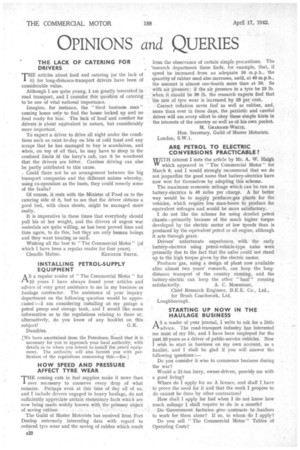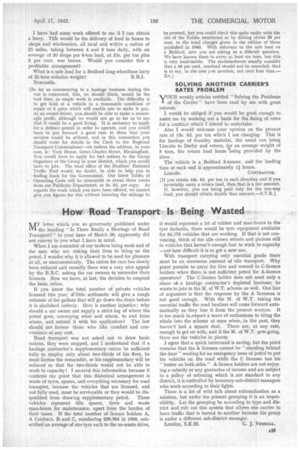OPINIONS and O UERIES THE LACK OF CATERING FOR DRIVERS rrIIE
Page 22

Page 25

If you've noticed an error in this article please click here to report it so we can fix it.
articles about food and catering (or the lack of I it) for long-distance-transport drivers have been of considerable value.
Although I am quite young, I am greatly interested-in road transport, and I consider this question of catering to be one of vital national importance.
Imagine, for instance, the " tired business man" coming home only to find the house locked up and no food ready for him. The tack of food and comfort for drivers is about equivalent in nature, but considerably more important.
To expect a driver to drive all night under the conditions such as exist-to-day on bits of cold toast and any scraps that he has managed to buy is scandalous, and when, on top of all that, he may have to sleep in the confined limits Of the lorry's cab, can it be wondered that the drivers are bitter. Careless driving can also be partly attributed to this cause.
Could there not be an arrangement between the big transport companies and the different unions whereby, using co-operation as the basis, they could remedy some of the faults?
Of course, it rests with the Minister of Food as to the catering side of it, but to see that the driver obtains a good bed, with clean sheets, might be managed more easily.
It is imperative in these times that everybody should pull his or her weight, and the drivers of urgent war materials are quite willing, as has been proved time and time again, to do this, but they are only human beings and they want treating as suct.
Wishing all the best to "The Commercial Motor" (of which I have been a regular reader for four years).
Cheadle Hulme. KENNETH S MITH .
INSTALLING PETROL-SUPPLY EQUIPMENT AS a regular reader of "The Commercial Motor" for 10 years I have always found your articles and' advice of very great assistance to me in my business as haulage contractor. The assistance of your inquiry department on the following question would be appreciated :—I am considering installing ab my garage a petrol pump and storage tank, and I would like some information as eo the regulations relating to these or, alternatively, do you know of any booklet on this
subject? G.K. Dumfries.
[We have ascertained from. the Petroleum Board that it is necessary for you to approach your local authority, with details as to where you intend to install the petrol equipment. The authority will also furnish you with particulars of the regulations concerning HOW SPEED AND PRESSURE• AFFECT TYRE WEAR THE coming cuts in fuel supplies make it more than ever necessary to conkrve every drop of what remains. Perhaps even at this time of day all of us, and I include drivers engaged in heavy haulage, do not sufficiently appreciate certain elementary facts which are now being made widely known with the primary object
of saving rubber.
The Guild of Master Motorists has received from Fort Dunlop extremely interesting data with regard to reduced tyre wear and the saving of rubber which result
from the observance of certain simple precautions. The 'research department there finds, for example, that, if speed be increased from an adequate 30 m.p.h., the quantity of rubber used also increases, until, at 40 m.p.h., the amount is almost one-fourth more than at 30. So with air pressure,: if the air pressure in a tyre be 25 lb. when it should be 30 lb. the research experts find that the rate of tyre wear is increased by 20 per cent.
Correct inflation saves fuel as well as rubber, and, more than ever in these days, the patriotic and careful driver will use every effort to obey these simple hints in the interests of the country as well as of his own pocket.
M. GRAHAME-WHITE,
Hon. Secretary, Guild of Master Motorists. London, S.W.1.
ARE PETROL TO ELECTRIC CONVERSIONS PRACTICABLE wiTH interest I note the article by Mr. A. W. Haigh VV which appeared in "The Commercial Motor" for March 6, and I would strongly recommend that we do not jeopardize the good name that battery-electrics have now won for themselves by adopting this scheme.
The maximum economic mileage which can be run on battery-electrics is 40 miles per charge. A far better way would be to supply producer-gas plants for the vehicles, which require Tess man-hours to produce for equivalent mileages, and would be more satisfactory.
I do not like the scheme for using derelict petrol chassis—primarily because of the much higher torque developed by the electric motor at low speeds than is produced by the equivalent petrol or oil engine, although it acts through gears.
Drivers' unfortunate experiences. with the early battery-electrics using petrol-vehicle-type axles were primarily due to the fact that the axles could not stand up to the high torque given by the electric motor.
Producer gas, using a design of plant now available after almost two years' research, can keep the longdistance transport of the country running, and the battery-electric can keep the other " haul " running satisfactorily. A. C. MounrsoN, Chief Research Engineer, B.E.E. Co., Ltd., for Brush Coachwork, Ltd.
Loughborough.
STARTING UP NOW IN THE HAULAGE BUSINESS A'a reader of your journal, I write to ask for a little advice. The road-transport industry has interested me most of my life, and I have been employed for the past 10 years as a driver of public-service vehicles. Now I wish to start in business on my own account, as a haulier, and I shall be glad if you will answer the following questions:—
Do you consider it wise to commence business during the war?
Would a 21-ton lorry, owner-driven, provide me with a good living?
Where do I apply for an A licence, and shall I have to prove the need for it and that the work I propose to do cannot be done by other contractors?
How shall 1 apply for fuel when I do not know how much mileage I shall require to do in a month?
Do Government factories give contracts to hauliers to work for them alone?, If so, to whom do I apply?
Do you sell "The Commercial Motor" Tables of Operating Costs?
I have had some work offered to me if I can obtain a lbrry. This would be the delivery of food in boxes to shops and wholesalers, all local and within a, radius of 25 miles, taking between 4 and 6 tons daily, with an average of 80 drops per 6-ton load, at 15s, per ton plus 5 per cent, war bonus. Would you consider this a profitable arrangement?
What is a safe load for a Bedford long-wheelbase lorry of 28-tons unladen weight? R.B.I. Newcastle.
[So far as commencing in a haulage business during the war is concerned, this, we should think, would be the best time, as ample work is available. The difficulty is to get hold of a vehicle in a reasonable condition of repair at a price which will enable one to make it pay. As an owner-driver, you should be able to make a reasonaVe profit, although we would not go so far as to say that it would be a good living. It is necessary to apply for a defence permit in order to operate, and you would have to put forward a good case to show that your services would be utilized, and in this connection you should write for details to the Clerk to the Regional Transport Commissioner—We believe the address, in your case, is: York House, Great Charles Street, Birmingham. You would have to apply for fuel rations to the Group Organizer of the Group in your district, which you would have to join. The local office of the Hauliers' National Traffic Pool would, .no doubt, be able to help you in finding loads for the Government. Our latest Tables of Operating Costs will be obtainable in about three weeks from our Publicity Department, at 2s. 2d. per copy. As regards the work which you have been offered, we cannot give you figures for this without knowing the mileage to be covered, but you could check this quite easily with the aid of the Tables mentioned or by adding about 20 per cent. to the total charges given in the edition of those published in 1940. With reference to the safe load on a Bedford, now you are asking us a. difficult question. We have known them to carry' at least six tons, but this is very inadvisable. The manufacturers usually consider that a 50 per cent, overload should not be exceeded; that is to say, in the case you mention, not over four tons.— ED. ]
SOLVING ANOTHER CARRIER'S RATES PROBLEM
y'OUR weekly articles entitled "Solving the Problems of the Carrier" have been read by me with great interest.
I would be obliged if you would be good enough to assist me by working out a basis for the fixing of rates for a contract which I intend to undertake.
' Also I would welcome your opinion on the present rate of 13s. 6d. per ton which I am charging. This is for haulage of foundry material, the usual run being Lincoln to Derby and return, for an average weight of 5 tons, the return load home 'being provided by the hirer. s
The vehicle is a Bedford 3-tomier, and the loading time at each end is approximately 14 hours.
Lincoln. CONTRACTOR.
[If you obtain 13s. 8d. per ton in each direction and if you invariably carry a return load, then that is a fair amount. If, however, you are being paid Only for the one-way load, you should obtain double that amount—S.T.R.]




















































